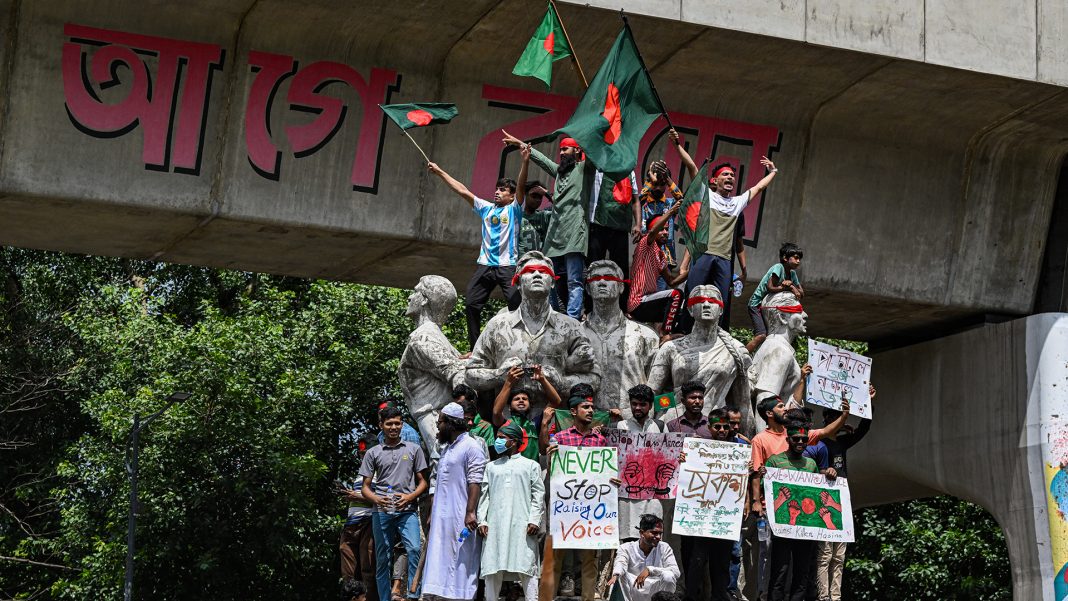Bangladesh, the third most populous Muslim country in the world, has seen a sudden change of power. Student protests that lasted several weeks led to the army removing Sheikh Hasina, who had led the country for 20 years, from power, and the commander of the Bangladesh Army announced that an interim government would be formed, headed by Nobel laureate Muhammad Yunus.
In this piece, Ascolta analyses the internal political processes in Bangladesh that led to the forced resignation of the country’s prime minister and the coming to power of an interim government led by the military. Based on the analysis, the possible consequences for both the country and the whole region, as well as the influence of external forces on such processes are considered.
This Content Is Only For Subscribers
Unpopular quotas
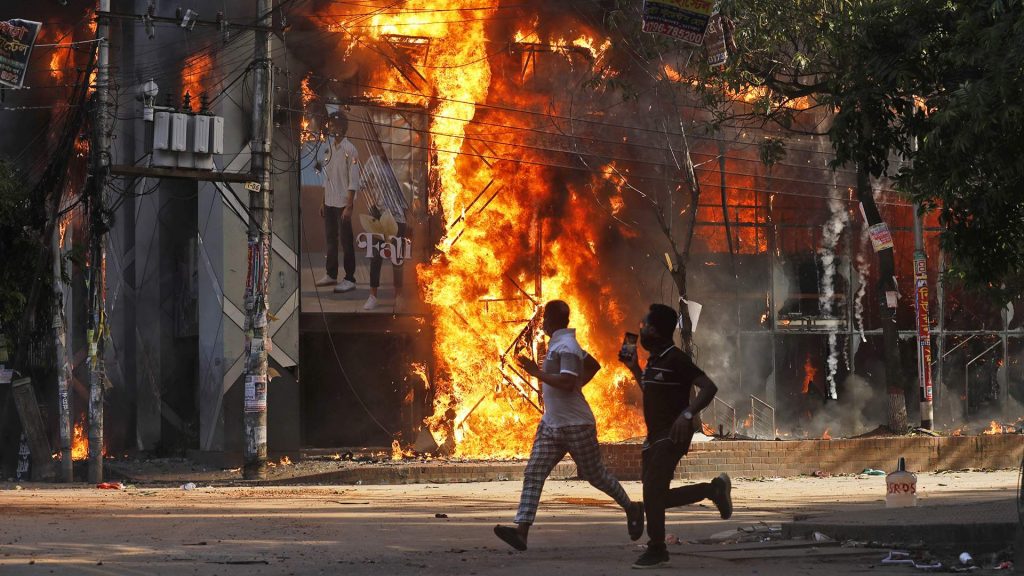
Protests that led to the change of power in the country began in different cities of Bangladesh back in late June. The protests erupted over the quota system, which reserves 30 per cent of government jobs for family members of veterans who fought in the war for Bangladesh’s independence from Pakistan in March-December 1971. The students found the return of this practice, which was cancelled in 2018, discriminatory. Especially, amid stagnant private sector and high unemployment, civil service is emerging as an attractive job opportunity. In the wake of the protests, the Bangladesh Supreme Court decided to drastically reduce the “veteran quotas” from 30 per cent to a symbolic 5 per cent.
On 19 July, as the protests were gaining momentum, it was reported that at least 39 people had died. However, the Bangladesh government did not comment on the death toll or the country’s internet outage. Police reported that protesters set fire to government buildings, while hackers broke into the official website of the law enforcement agency and described what was happening in the country as a “war for justice, for freedom and for our future”. The exact death toll is unknown, but Western media, citing figures provided by police and medics, say more than 300 deaths have been recorded since July during the protests, with 13 police officers beaten to death in the town of Sirajganj.
Prime Minister Hasina has invited student leaders to enter into talks and promised a thorough investigation into all cases of violence by security forces. Ironically, Sheikh Hasina was also once a student leader and it was the student movement that brought her into big politics. But she failed to find common ground with the students and the protesters rejected her proposal. “It is impossible to negotiate with a government of murderers. The time to ask for forgiveness has passed,” said Nahik Islam, coordinator of the Student Movement Against Discrimination, and announced the start of a new nationwide disobedience action. The protesting students called on fellow citizens not to pay utility bills, not to go to work and to use all other means of mass disobedience. The students were supported by the country’s leading opposition force, the Bangladesh Nationalist Party (BNP). On 4 August, people took to the streets demanding the resignation of Sheikh Hasina’s government. The protests were accompanied by arson, vandalism, road blockades, attacks on police stations and attempts to seize buildings.
After that, the authorities tried to tighten the screws, but these measures failed to save Sheikh Hasina’s political career.
Hasina’s flight
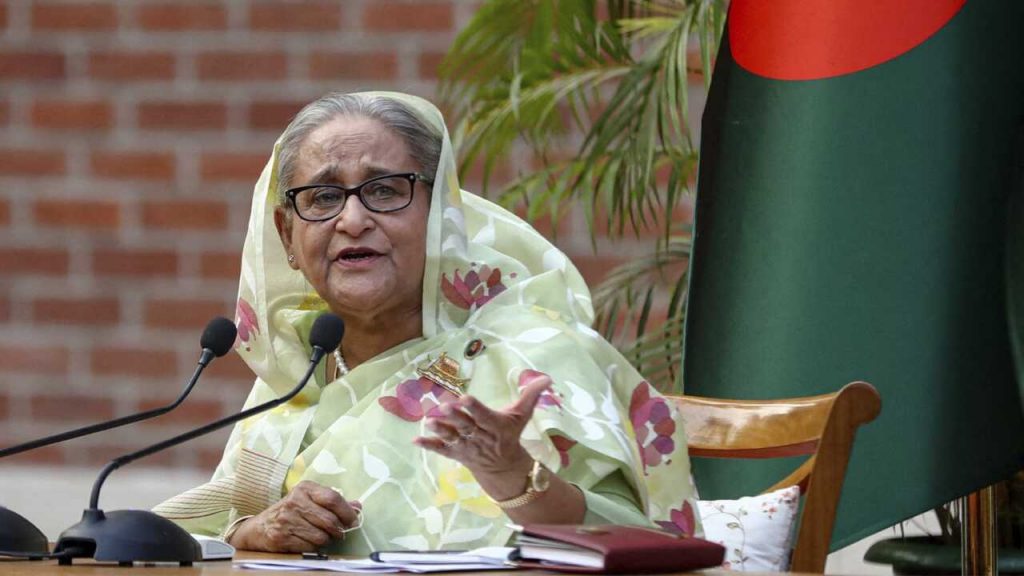
As early as the morning of 5 August, nothing seemed to portend a dramatic denouement. However, in the afternoon, information emerged that Sheikh Hasina and her sister had urgently left the government residence in Dhaka for security reasons and fled the country in a military helicopter to neighbouring India. The New York Times quoted security officials, diplomats and officials as saying that before the protesters seized her residence, the heads of security agencies tried to persuade the prime minister to leave the country, while she insisted on suppressing the protests. Her sister Sheikh Rehana, who lives in London and had travelled to visit, asked that they be left alone to try to dissuade Hasina. However, the latter still resisted. Eventually the army chief of staff, General Waker-uz-Zaman, called her son Sajib Wazed, who lives in Virginia, to influence the mother.
“She wanted to stay, she didn’t want to leave the country at all,” the son later told me. “We were primarily concerned about her physical safety. So we persuaded her to leave,” he added.
The prime minister was put into a car, with armoured vehicles clearing the way. Hasina was taken to a helipad and from there a helicopter took her to the airfield where she boarded a helicopter. When TV channels announced that the army commander would address the nation after hours of silence from the prime minister, protesters realised she had resigned.
According to news agency ANI, Sheikh Hasina met the Indian prime minister’s national security adviser Ajit Doval on her arrival in India, while Prime Minister Narendra Modi himself discussed the situation in Bangladesh with his key ministers. Meanwhile, no official statement from the Prime Minister’s office on her behalf in the early hours, was made. Her resignation was announced by Bangladesh Interior Minister Asaduzzaman Khan to Indian TV channel CNN-News18.
The resignation of Bangladesh Prime Minister Sheikh Hasina, daughter of the founder of the independent “country of Bengal” and its first president Mujibur Rahman, who was assassinated in a 1975 military coup, has shaken South Asia.
The 76-year-old Hasina has ruled continuously since 2009. As prime minister, she took important steps to bring Bangladesh into the global economic arena. With solid funding from the World Bank, Hasina implemented a number of large-scale infrastructure projects and digitalisation. The economy grew at an average annual rate of 6 per cent between 2009 and 2023. Bangladesh is second only to China in textile exports. Over the past 50 years, the country has transformed itself from a predominantly agrarian and one of the poorest countries in South Asia into a textile Asian “tiger”, largely due to the growth of mass-market clothing brands H&M and Zara. One of Bangladesh’s key trading partners is the European Union, which accounted for 20.7 per cent of trade in 2023. About 80 per cent of textile exports go to the EU and the US. And overall, the light industry contributes more than 75% of the country’s revenue.
However, the benefits of economic growth have been realised only by the rich, whose capitals have grown so much that Bangladesh has become the third fastest growing country in the world for the wealthy. While the bulk of the people struggled with the rising cost of living. Last year, Hasina promised to turn Bangladesh into a prosperous and developed country. However, the 18 million unemployed Bengalis did not have much faith in her projections. Industrial workers’ strikes shook the country late last year, and the final chord was the current student protests, which quickly turned into a nationwide movement against Hasina.
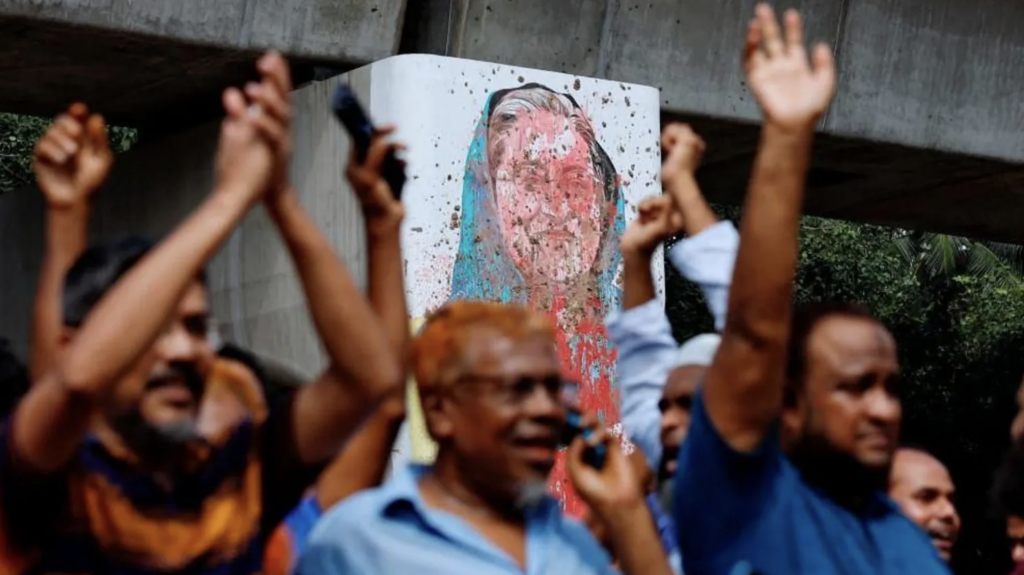
Against a backdrop of economic problems, her premiership began to slip towards authoritarianism and was marred by serious human rights abuses. Human rights organisations accused Hasina’s government of abusing state institutions to consolidate its power and stifle dissent, including through extrajudicial executions of opposition activists. as well as corruption and the growing fortunes of people close to Sheikh Hasina. As critics of the regime have said – the daughter of the revolution has destroyed the rudiments of democracy on which she grew up and fought for.
Even at the beginning of the year, Prime Minister Hasina’s position looked quite strong, despite the difficult domestic political situation. In the parliamentary elections held in Bangladesh in January, Hasina’s decade-and-a-half-old ruling Awami League party won. It won 223 seats in the 350-seat parliament. Sheikh Hasina’s re-election became inevitable after the opposition, led by the Bangladesh Nationalist Party, boycotted the election and its leader Khaleda Zia remained under house arrest.
The outwardly comfortable victory for the Awami League was achieved with low voter turnout (turnout was around 40 per cent). The Bangladesh Nationalist Party then called on its supporters to boycott the election. Throughout 2023, the opposition held nationwide protests, accompanied by violence and clashes with police, demanding the early resignation of the government. BNP activists engaged in road blockades, arson attacks on vehicles, and threatened to block the work of the electoral commission. In response, Sheikh Hasina accused the opposition of using terrorist methods, but quelled the protests nonetheless.
The experienced Sheikh Hasina knew better than anyone else all the twists and turns of the politics of the “country of Bengal”, created in 1971 as a result of the war of independence from Pakistan, and until the last moment demonstrated her ability to hold her ground. This time, however, she failed to hold back the onslaught of protesters.
The role of the army
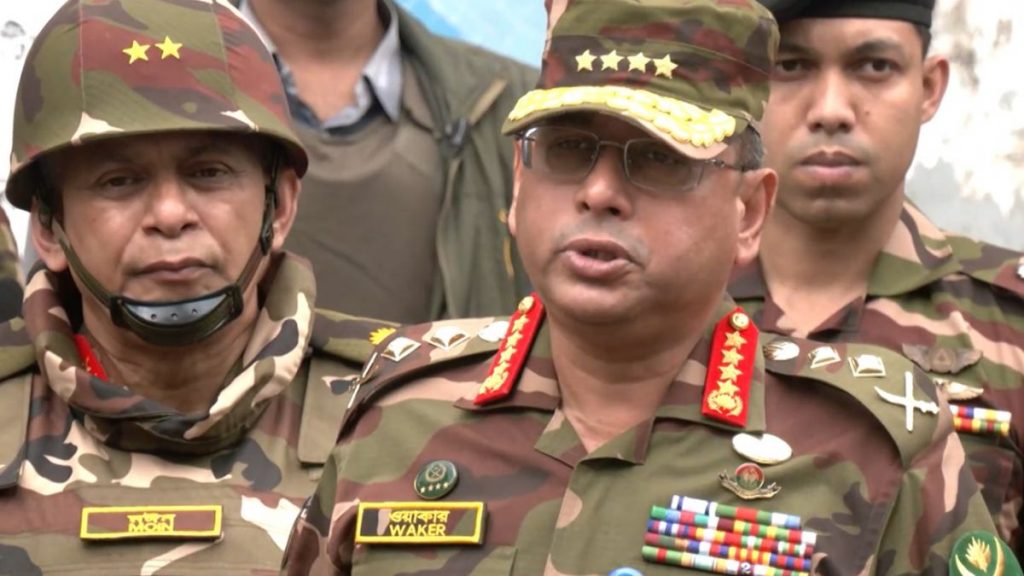
After Sheikh Hasina fled the country, the army took responsibility for the situation in the country. Bangladesh Army Commander General Waker-uz-Zamana addressed the nation in a message broadcast by the country’s TV channels and announced that “a political transition is underway” and that an interim government would be formed. The senior officer also promised amnesty for students and demonstrators arrested during protests in recent weeks. Finally, he asked his compatriots to avoid further violence and to trust the army, promising that the latter would ensure peace and order until a new leader comes to power. “After holding discussions with all political parties, we have decided to form an interim cabinet. I take full responsibility,” the Bangladesh Army chief said.
It should be said that Bangladesh is a record-breaker in South Asia in terms of the frequency of the army’s intervention in political life. In half a century of independence, there have been a dozen attempted military coups of varying degrees of success. The darkest was the first when on 15 August 1975, President Mujibur Rahman, known as the father of Bangladeshi independence was assassinated in his own residence along with his wife. Only two daughters who were abroad, one of them Sheikh Hasina, survived.
Unlike India, where the army has historically played no role and is subordinate to the civilian government, things in Bangladesh are much closer to the Pakistani model. The civilian government has no unquestionable authority and the armed forces feel entitled to have a strong say during frequent political crises. But there is one important detail that distinguishes Bangladesh’s military from both its Indian and Pakistani counterparts. The armies of India and Pakistan were formed in 1947 when, after the British left, soldiers and officers of the colonial army became the backbone of the armies of the two newly independent states. The Bangladesh Army, on the other hand, was formed directly during the war of independence from Pakistan in 1971. Initially, the Mukti Bahini (“Liberation Army”) was a collection of guerrilla units that acted quite autonomously. After the Pakistani expulsion, their commanders became colonels and generals in the armed forces, but were reluctant to recognise any authority over them. The direct consequence of this was a series of military coups in the 1970s, but the influence of the guerrilla roots is still felt today.
It is worth noting that the military leadership’s calls for an end to the unrest had no immediate effect. Protesters in the Bangladeshi capital Dhaka set fire to several offices of the ruling Awami League party and the Memorial Museum of the country’s first president Mujibur Rahman. Several people stormed the residence of the country’s chief justice. According to the newspaper’s sources, the vandals removed all valuable items from the residence. The Chief Justice of the country himself had left the residence hours before. Then they smashed the residences of Sheikh Hasina and Interior Minister Asaduzzaman Khan and seized the parliament building. Curfew was imposed in Bangladesh, the international airport in Dhaka was closed and railway traffic was also suspended. Garment factories (their work is the backbone of Bangladesh’s economy) stopped working. The police went on strike – as stations across the country came under attack.
After that, the military held consultations with the country’s president Shahabuddin Chuppu and student protest leaders. They resulted in an announcement that parliament would be dissolved and an interim government would be set up, with Nobel Peace Prize winner Muhammad Yunus asked to lead it. Both of these demands were made by the organisers of the protests, threatening to bring people back to the streets if they were not met.
Nobel laureate
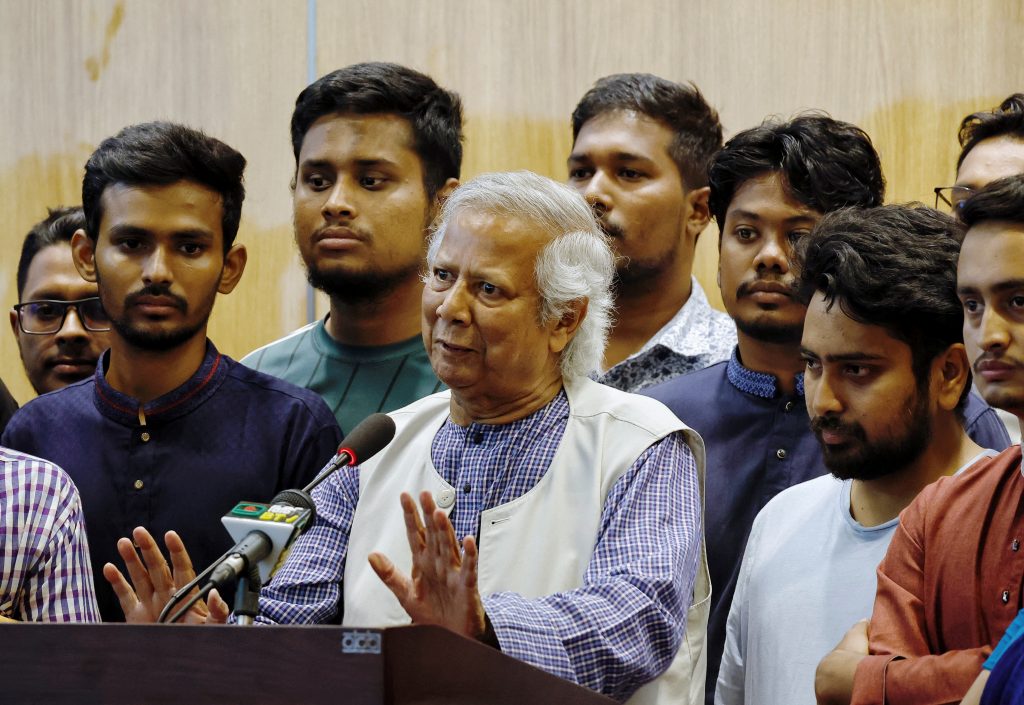
The acute phase of confrontation in Bangladesh after mass protests and the unexpected resignation of Prime Minister Sheikh Hasina has come to an end, turning into a debate about a complete reset of power. Following the end of the unrest and a military-backed decision to dissolve parliament and form an interim government, the main newsmaker was 84-year-old Nobel Peace Prize-winning economist Muhammad Yunus. Leaders of the student protests called on him to oversee the formation of a new cabinet. The news that he has been asked to be the “flag bearer” of Bangladesh’s new revolution caught 84-year-old Muhammmad Yunus in Paris, where he was in Paris at the invitation of the International Olympic Committee, monitoring the Olympics and also undergoing medical treatment.
“When I was contacted on behalf of the students, I didn’t agree at first. I told them I had a lot of work to do. But the students persisted in asking me. If the students can sacrifice a lot, if the people of the country can sacrifice a lot, then I also have a responsibility. Then I told the students that I can take responsibility,” Muhammad Yunus said, promising to return to the country “as soon as possible”. Assessing the developments in Bangladesh, he compared it to the country’s independence in 1971 when East Pakistan seceded from the Pakistani state. “Today is a day of general jubilation in the country. Millions of people are on the streets. Today, Bangladesh is celebrating the same way it celebrated independence in 1971,” Muhammad Yunus said. “Then we gained independence, today we are free from the totalitarian government,” he proclaimed.
The architect of the modern state of Bangladesh, the country’s first president Mujibur Rahman, who was killed in a military coup in 1975, was the father of the deposed Sheikh Hasina, who built her policy on his political legacy. Thus, labelling her rule as “totalitarian”, the newly minted leader, the second revolution in Bangladesh’s history, called for the beginning of dismantling the policies of the Rahman-Hasina dynasty. Muhammad Yunus received his Nobel Peace Prize for introducing the concept of microcredit and microfinance, which was designed to stimulate small-scale entrepreneurship and help lift millions of people out of poverty around the world.
Grameen Bank, which he founded in 1983, was supposed to be the vehicle for implementing Yunus’ plan. However, after launching his initiative, the future Nobel laureate clashed with Sheikh Hasina, who accused him of financially defrauding peasants who had to pay interest rates of around 20 per cent per annum on the micro-loans they received. In 2022, the Bangladesh Anti-Corruption Commission launched an investigation into Mr Yunus’ charitable funds, after which a Dhaka court accused him and 13 other employees of Grameen Telecom, a telecommunications company he founded, of embezzling funds from the labour fund. He was given six months in jail, but the court later reviewed the case and acquitted him. He left the country for Paris the same day.
Two years later, 84-year-old Muhammad Yunus returned to the country. By the time Yunus returned, the situation in Bangladesh had normalised. The pogroms in Dhaka had stopped, although many schools and private businesses remained closed. Garment factories reopened on 7 August. Following the change in leadership, police officers went back to work, with the president instructing them to take strict measures to ensure order. On 8 August, Yunus’ government was sworn in. At the ceremony, he promised to “uphold and defend the country’s constitution and sincerely fulfil his duties,” and called on citizens to stop violence.
“A brutal, autocratic regime is a thing of the past,” Yunus said during an address to the nation after taking office. “As the sun rises, democracy, justice, human rights and full freedom of fearless expression will be available to all, regardless of party affiliation. That is our goal.”
Yunus’ transitional government is a broad alliance of various social actors. For instance, the law ministry is headed by Azif Nazrul, a renowned legal scholar and lecturer at Dhaka University Law School. For many months, this university has been the centre of the youth protest movement and the mainstay of the Students’ Movement Against Discrimination. In addition to Azif Nazrul, who has taken charge of the Ministry of Justice, the interim government of Bangladesh includes two leaders of the recent student protests, Nahid Islam and Mahmud Sajib Bhuiyan. The former will head the Ministry of Telecommunication and Information Technology and the latter the Ministry of Youth and Sports. In general, the new government, which was formed under tight deadlines, looks very diverse – the transitional cabinet includes politicians, public figures, former officials, retired military officers, as well as civil activists and leaders of the student movement.
Some of the appointments looked quite unexpected. For example, the Ministry of Industries was headed by human rights activist Adilur Rahman Khan. Publisher, writer and human rights activist Farida Akhtar, known for her fight for women’s rights in Bangladesh, was given the portfolio of Fisheries and Livestock Minister. Former attorney general Hasan Ariff became local government minister. Supradip Chakma, a career diplomat with the rank of ambassador, will take up the development of mountain road network in Chittagong region.
Meanwhile, former Bangladesh Foreign Minister Tuhid Hossain, a career diplomat who has worked in Asia, Africa and Europe for many years, as well as author of a book on Bangladesh’s relations with the European Union and a well-known international affairs columnist in the country, has been made the acting foreign minister.
The closest person to Acting Prime Minister Muhammad Yunus in the caretaker government is Health Minister Nurjahan Begum, who was behind Grameen Bank, a microfinance bank he founded in the mid-1970s. It should be recalled that Grameen Bank once became a tool for the implementation of a microfinance scheme for socio-economic growth “from below”, for which Muhammad Yunus received the Nobel Peace Prize in 2006. After his resignation as managing director of the bank in 2011, Mrs Begum replaced him.
Michael Kugelman, director of the South Asia Institute at Washington’s Wilson Centre, warned that Hasina’s departure would “leave a huge vacuum” and that the country would be in “uncharted territory”. However, it seems that the figure of Muhammad Yunus may help fill that vacuum and ensure that the country has a peaceful democratic transition and new fair elections. At any rate, there are grounds for cautious optimism.
Old and new players
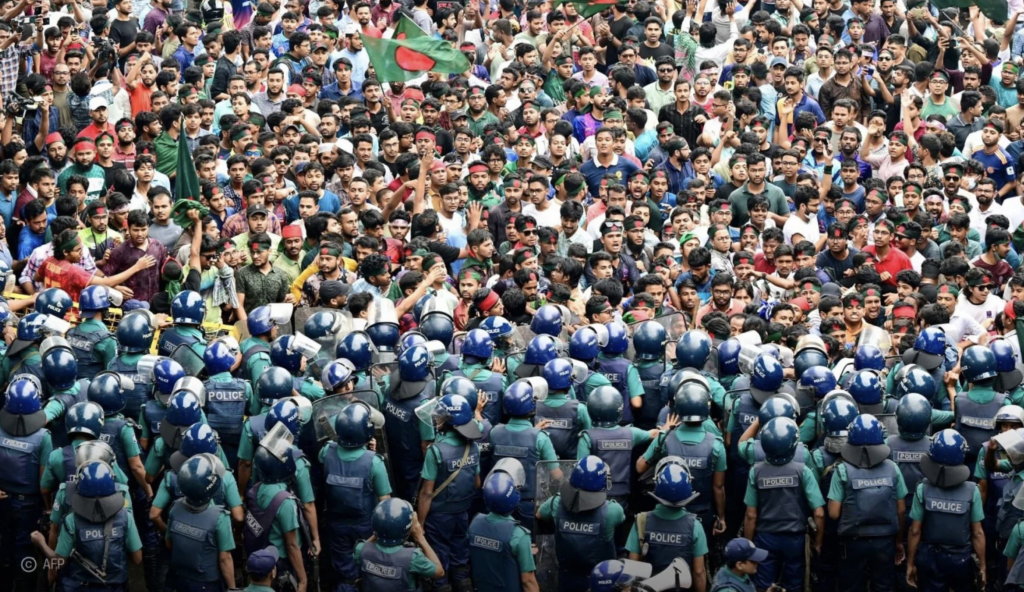
To ensure the country’s transition to democracy, Yunus must not only ensure that the student movement is politically organised, but also keep an eye on other competing centres of power.
There have long been three key players on the political field in Bangladesh. They are the former ruling Awami League (Awami League) party, which backed former prime minister Sheikh Hasina. Local analysts predict the party is certain to split. Many of its senior members are inextricably linked to Hasina and corruption, and will have very limited political appeal. But the Awami League has a younger faction, many of them women, who would like to move up the ranks.
Hasina also intends to return to political activity. However, it was not she who announced this, but her son Sajeeb Wazed Joy, who lives in the US. “My mother has not officially resigned. She was planning to make a statement and resign. But then the protesters rushed towards the prime minister’s residence. And there was no time. My mother didn’t even pack her bags. According to the constitution, she is still the prime minister of Bangladesh,” Sajib Wazed recalled in an interview with Reuters. According to him, Sheikh Hasina intends to return to her homeland when the date of the snap election is announced, in which the Awami League (People’s Party), which she leads, intends to win and retain a majority in parliament.
Of course, Sheikh Hasina’s return to big politics is hardly believable today, especially since the representatives of the protest movement who have joined the new government have already announced their intention to try Sheikh Hasina, who still has many supporters in the country. “We want to arrest her. Whether it will be done through the normal judicial system or through a special tribunal, we are discussing how to implement it,” Nahid Islam, a leader of the student protests yesterday and today the acting minister of post, telecommunications and information technology, said.
The country’s other main party, the relatively secular Bangladesh Nationalist Party (BNP), will see itself as naturally entitled to come to power after Hasina is ousted. Bangladesh President Mohammed Shahabuddin on 5 August evening ordered the release of prisoners involved in the protests, as well as former prime minister and key opposition leader Khaleda Zia, 78, who is terminally ill and was jailed on bribery charges by her main rival Hasina. Her son Tariq Rahman has long been in exile in London over corruption allegations.
The BNP has largely lost its influence in the country. The seven parliamentary seats it won in the disputed parliamentary elections in January 2024 cannot be attributed to political repression alone. The BNP’s disappointing result in last year’s elections has led many observers in Bangladesh to question whether the former ruling party, which has won four national and two presidential elections since its inception in 1978 but has not been in power since 2006, can ever regain its position as a major party.
There are a number of reasons for this. Firstly, the party has ceased to enjoy popular support. Second, the BNP has failed to integrate with influential social movements over the past few years. Third, the BNP does not have a clear agenda. In the eyes of the Bangladeshi public, the Bangladesh National Party wants to be in power but offers no explanation as to what exactly it will do – or change – once it forms the government. Moreover, the BNP does not appear to adhere to any particular ideology, making it an even less attractive opposition force.
While most political parties and groups in Bangladesh are largely clientelist, they still have a core ideology. Even the Awami League (AL) has a nationalist ideology, albeit malleable due to the prominent role it played in the liberation war. The BNP, on the other hand, was not founded on a legacy that it could turn into a coherent and attractive ideology. From the beginning, it was a mixture of elements: leftists dissatisfied with AL’s nationalism, rightists yearning for an Islamist revival, opportunists and establishment figures from the Pakistan era, sidelined by the new rulers after Bangladesh’s independence.
The most organised alternative to the two old parties are various Islamist groups, including the banned Jamaat-e-Islami party. They have been kept out of power for many years, but there is a strong possibility that an Islamist-led coalition could win the elections, if held, even against the army’s preferences.
An alternative to the old parties could be the Student Movement Against Discrimination, which has been the main driving force behind the protests. It is possible that Muhammad Yunus will succeed in transforming it into a political party, but so far this is out of the question. In the meantime, new political forces may appear out of thin air. We cannot write off the military, who, once the situation stabilises, will be interested in creating their own pocket political projects to win elections. However, judging by all appearances, this process will be chaotic and not so fast.
Foreign policy uncertainty
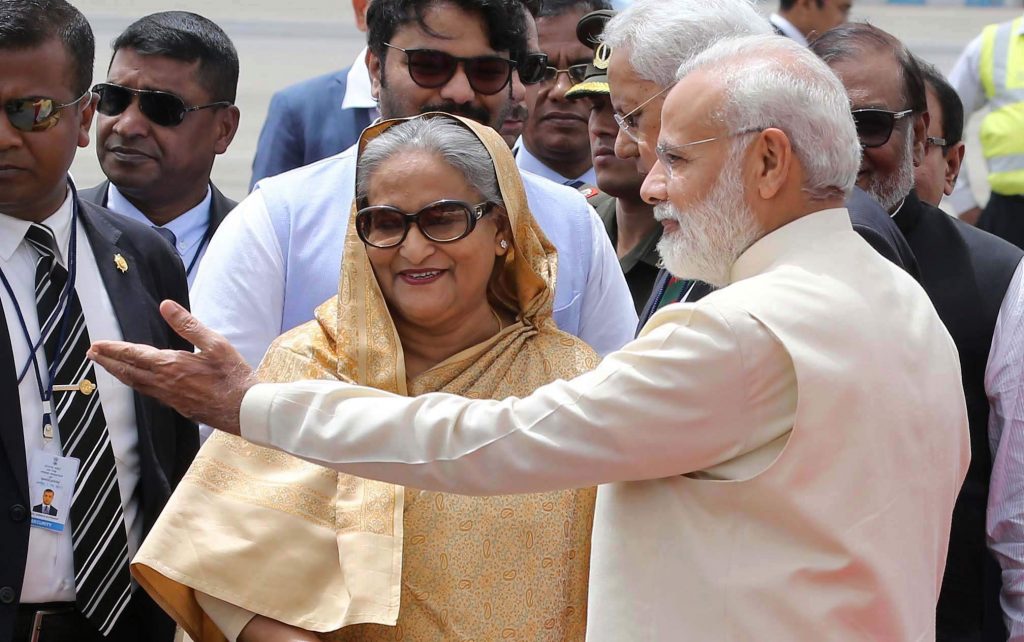
The change of power in one of South Asia’s largest states has led to a protracted clash of interests between the West and the states of the Global South, backed by Russia. Each of the geopolitical players has its own resonances and views on the reasons for what happened in Bangladesh.
The biggest loser today is believed to be Indian Prime Minister Narendra Modi, who has a long and close personal relationship with Hasina, including shared inclinations towards autocratic politics. Modi and India’s security services have long bet on Hasina to maintain stability in Bangladesh and prevent the influence of Islamists as well as regional rival China.
The closeness of the relationship is underlined by the fact that in June this year Bangladesh became the first country Indian Prime Minister Narendra Modi visited immediately after winning the general election. With Hasina’s departure, Modi lost his closest ally in South Asia, which naturally underscores India’s declining influence among its South Asian neighbours. India fears the growing influence of China and Pakistan, hostile to India, on Bangladesh. Indian media have published articles suspecting Pakistani intelligence in organising the riots. It could allegedly support the youth wing of the Islamist party Jamaat-e-Islami Bangladesh. Increased focus on Beijing would aggravate Delhi’s already difficult strategic position in the region. The fact is that India recently faced a similar reorientation towards China in its ally, the Maldives, with the arrival of a new president there, Mohamed Muizzou.
It is worth noting that even under Hasina, Bangladesh’s foreign policy was generally balanced. While in the 20th century the Awami League was oriented only towards the Soviet Union and India, in the 21st century China was added to the list. Just before her ouster in July this year, Sheikh Hasina visited Beijing and met Chinese President Xi Jinping. China and Bangladesh upgraded bilateral relations to a comprehensive strategic co-operation and partnership. The Chinese leader promised to share experiences of party and state governance and integrate supply and production chains between the two countries. Sheikh Hasina, for her part, emphasised the important role of the Belt and Road Trade and Infrastructure Initiative in boosting the regional economy and hoped for the growth of its projects in Bangladesh. In 2022, more than 500 Chinese firms were working in Bangladesh. They built roads, power plants and modernised ports. Bangladesh’s Ministry of Energy in March 2024 reported plans to receive $30 billion from China to develop the industry.
It is important to note that Sheikh Shahina has long looked with undisguised envy towards the one-party Chinese model of governance, considering it more effective than the multi-party Indian one. And besides, Bangladesh’s trade turnover with China is $27.8 billion against $13 billion with India. So Beijing has been watching the protests in Bangladesh with concern.
With Muhammad Yunus coming to power, Bangladesh has a good chance of restoring relations with the US. Hasina has had a long history of personal antipathy towards Washington. Last year, she refused to hand over St Martin’s Island in the Bay of Bengal for a US military base. During the January elections, former US ambassador to Bangladesh Peter Haas came out in defence of democratic values and opposition parties. At that time, not only Hasina but also the Russian Foreign Ministry accused him of trying to implement a “colour revolution” scenario. India’s first deputy foreign minister Vinay Kwatra made a similar statement in those days. “As for the events in Bangladesh, the elections in Bangladesh, this is their internal matter. It is for the people of Bangladesh to decide the future of their country,” he warned, expressing full support to the Sheikh Hasina government.
During the current protests, the loudest voice in defence of democracy has come from Washington, and the face of the new Bangladesh has become, according to some media reports, a long-time favourite of former US President Bill Clinton, Muhhamad Yunus. Now the United States has every opportunity to restore its influence, which could potentially be supplemented with military assistance. Incidentally, the US authorities have warmly supported the announcement to form an interim government in Bangladesh and urged restraint on all sides. US State Department spokesman Matthew Miller said.
“Too many lives have been lost in recent weeks, and we call for order and restraint. We welcome the announcement of the formation of an interim government and encourage any further transfer of power to be conducted in accordance with Bangladesh’s laws,” Miller said during the briefing.
Another country of interest, oddly enough, was Australia. It is certainly in Australia’s interest to see a politically stable and prosperous Bangladesh, preferably in the form of a secular and non-aligned democracy. With civil war ravaging Myanmar, there are serious concerns about the stability and security of the Bay of Bengal region. Canbera is hopeful that the new Bangladesh government will be able to overcome many of the challenges it faces. For Dhaka itself, however, the Myanmar civil war is a real headache.
Bangladesh’s greatest fear is the potential exodus of Rohingya refugees, a Muslim minority living in Myanmar, who could join the 1.2 million Rohingya already sheltering in the country. Fighting has been particularly fierce in neighbouring Rakhine state, where fighting is ongoing between Myanmar government forces and the powerful armed group the Arakan Army (AA). The AA represents Rakhine’s Buddhist majority and is fighting for autonomy for the region. The Rohingya community has just found itself at the epicentre of the fighting. Hasina’s government has largely avoided attempts to influence the outcome of Myanmar’s civil conflict. But as local experts point out, there are fears that the Bangladesh Army may be tempted to play a more active role in Rakhine state, especially in an attempt to keep the remaining Rohingya where they are and keep them out of Bangladesh. Such efforts could have unpredictable consequences for Bangladesh.
The arrival of a new, more pro-Western government in Dhaka could not only be a headache for India but also hit Russia’s interests. The country is Russia’s second most important partner in South Asia. 90 per cent of its exports to Russia are apparel. In addition, Russia has been building the Ruppur nuclear power plant in Bangladesh since 2017 – Russia’s major $12bn project in Bangladesh, for which, as reported in the media, the loan was given by Moscow itself. The project is in its final stages and the nuclear power plant is scheduled to start up in September 2024.
Despite statements from Moscow that the project is not threatened by political re-turbations, the Russian Federation still fears how the new interim government will view the project. They may declare that all agreements made by the previous leaders are a thing of the past and may well demand that the terms of the agreements that were granted be changed. The project may be put on hold and even frozen while the proceedings and bidding take place. Although there has been no statement yet from Dhaka, which hosted Russian Foreign Minister Sergei Lavrov in September 2023, as to whether it intends to renegotiate co-operation with Moscow.
Today, the interim government, at least rhetorically, is in no hurry to define its foreign policy priorities. “We want to maintain good relations with everyone. We need to maintain a balance in relations with major countries,” acting Bangladesh Foreign Minister Tuhid Hossain said late last week, refraining from naming the interim government’s international priorities. The main task at this stage is to restore law and order, he said, adding that relations with the outside world can be resolved only after the transit of power is completed and the situation in the country returns to normal.

